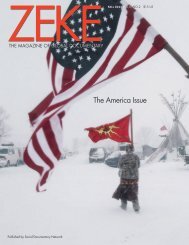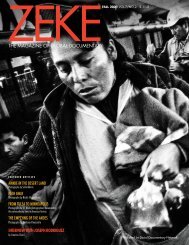ZEKE Fall 2019
Contents includes: "Youth of Belfast" by Toby Binder, and "Delta Hill Riders" by Rory Doyle, winners of ZEKE Award for Documentary Photography "Rising Tides" with photographs by Sean Gallagher, Lauren Owens Lambert, and Michael O. Snyder "Out of the Shadows: Shamed Teen Mothers of Rwanda" by Carol Allen Storey Interview with Lekgetho Makola, Head of Market Photo Workshop, South Africa, by Caterina Clerici "Why Good Pictures of Bad Things Matter" by Glenn Ruga Book Reviews and more...
Contents includes:
"Youth of Belfast" by Toby Binder, and "Delta Hill Riders" by Rory Doyle, winners of ZEKE Award for Documentary Photography
"Rising Tides" with photographs by Sean Gallagher, Lauren Owens Lambert, and Michael O. Snyder
"Out of the Shadows: Shamed Teen Mothers of Rwanda" by Carol Allen Storey
Interview with Lekgetho Makola, Head of Market Photo Workshop, South Africa, by Caterina Clerici
"Why Good Pictures of Bad Things Matter" by Glenn Ruga
Book Reviews and more...
- No tags were found...
You also want an ePaper? Increase the reach of your titles
YUMPU automatically turns print PDFs into web optimized ePapers that Google loves.
1999 and the creation of the<br />
Northern Ireland Assembly—a<br />
power-sharing legislative<br />
body that has the ability to<br />
make laws in areas including<br />
housing, employment, education,<br />
and health. By the time<br />
the bloodshed and bombings<br />
ceased, more than 3,600<br />
people had died and thousands<br />
more were injured. In the<br />
decades since the treaty was<br />
fast<br />
As the country’s hardwon<br />
power sharing<br />
agreement flounders,<br />
Brexit looms with uncertainty,<br />
and the country’s<br />
youth face issues of<br />
continued segregation<br />
and suicide, a united<br />
Northern Ireland is more<br />
important than ever.<br />
signed peace has been successful,<br />
albeit tenuous. Now, as<br />
the country’s hard-won political<br />
assembly flounders, Brexit<br />
looms with uncertainty, and the<br />
country’s youth face issues of<br />
continued segregation and suicide,<br />
a united Northern Ireland<br />
is more important than ever.<br />
A Legacy of<br />
Violence<br />
While Northern Ireland’s youth<br />
have experienced the fruits of<br />
peace rather than the tribulations<br />
of war, research has<br />
found that intergenerational<br />
trauma continues to affect<br />
the country’s population. A<br />
2010 study by researchers<br />
at the University of Ulster in<br />
Northern Ireland found that<br />
30 years after Bloody Sunday,<br />
the victims’ children and<br />
immediate family members<br />
reported significant psychological<br />
distress. In some cases,<br />
especially among those closest<br />
to the victims, their distress<br />
was comparable to those who<br />
had lived through war itself.<br />
Stephen Mullan, the executive<br />
director of Dreamscheme—an<br />
organization that works with<br />
at-risk youth in Belfast—has<br />
observed this intergenerational<br />
trauma.<br />
“When there’s pain<br />
in your family history,<br />
that’s harder to get over,”<br />
Mullan said. “There’s a lot<br />
of emotion that’s passed<br />
through those stories.”<br />
More broadly, Northern<br />
Ireland’s youth are struggling<br />
with mental health issues,<br />
including anxiety and depression.<br />
The legacy of conflict,<br />
continued discrimination, poverty,<br />
and high unemployment<br />
are all contributing factors.<br />
As a result, Northern Ireland’s<br />
suicide rate is one of the highest<br />
in the United Kingdom.<br />
Between 1999 and 2014,<br />
more than 3,700 people lost<br />
their lives to suicide and nearly<br />
a fifth of those people were<br />
under 25 years old. Studies<br />
have linked the high youth<br />
suicide rate to the conflict in a<br />
number of ways. In particular,<br />
poverty combined with continued<br />
segregation is thought to<br />
increase risk factors that may<br />
result in suicide.<br />
“Kids now are not so much<br />
hurting each other,” Mullan<br />
said. “But hurting themselves.”<br />
Sectarianism &<br />
Segregation<br />
While the country’s ‘peace<br />
walls’ are slowly being torn<br />
down, sectarianism and<br />
segregation still linger. In housing<br />
estates such as Creggan,<br />
where poverty and unemployment<br />
are high, sectarian sentiments<br />
are strong and appear to<br />
be increasing as paramilitaries<br />
regroup. Earlier this year, on<br />
the night before Good Friday,<br />
journalist Lyra McKee was shot<br />
dead during a riot in Creggan.<br />
The New IRA, a radical splinter<br />
group of the original IRA, later<br />
claimed responsibility but no<br />
one has been charged with her<br />
murder.<br />
Segregated schools add<br />
to the problem. Only seven<br />
percent of school-aged children<br />
in Northern Ireland attend an<br />
officially integrated school.<br />
This low percentage has created<br />
a barrier to friendships<br />
that stretch across ideological<br />
lines. These divisions, however,<br />
are disliked by young<br />
people, many of whom prefer<br />
integrated education. Dirk<br />
Schubotz, a senior lecturer at<br />
Queen’s University in Belfast,<br />
directs an annual survey of<br />
16-year-olds across Northern<br />
Ireland and says this growing<br />
preference for integrated<br />
schools reflects young people’s<br />
desire to separate themselves<br />
from the past.<br />
“Young people go out of<br />
their way to say that ‘this is not<br />
our conflict, it’s our parent’s or<br />
our grandparent’s,’” Schubotz<br />
said. “We also live at a time<br />
where religion has become less<br />
important— that’s not unique to<br />
Northern Ireland, but there’s a<br />
different element because of the<br />
conflict.”<br />
Looking Toward<br />
the Future<br />
Even in its uncertainty, the<br />
prospect of Brexit has posed<br />
a new concern for segments<br />
of Northern Ireland’s youth. A<br />
recent report found that 61 percent<br />
of middle-income teenagers<br />
are highly concerned about<br />
withdrawing from the European<br />
Union. Brexit, if enacted, would<br />
have wide-reaching implications<br />
for trade, immigration<br />
and Northern Ireland’s shared<br />
border with the Republic of<br />
Ireland. More locally, Northern<br />
Ireland’s political system has<br />
essentially unraveled. The country’s<br />
power-sharing Assembly<br />
has not been in session for<br />
more than two years due to a<br />
falling out between Republican<br />
and Unionist parties. For many<br />
young people, optimistic that<br />
the future of Northern Ireland<br />
is one of unity, the Assembly’s<br />
failing is a reminder that the<br />
shadow of conflict will be present<br />
as long as divisions persist.<br />
“Most young people<br />
would like Northern Ireland<br />
to progress to the point where<br />
you wouldn’t have to ask if<br />
someone is British or Irish,”<br />
says twenty-one-year old Tara<br />
Grace Connolly who grew up<br />
in Belfast. “We would like a<br />
future of prosperity and progress,<br />
not fear.”<br />
<strong>ZEKE</strong> APRIL FALL <strong>2019</strong>/ 2015/ 13

















